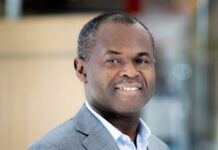
Editor’s Note: This is the third installment of a five-part series speaking with the top tech professionals at Rhode Island’s biggest employers.
As the employer of 630 local IT workers, Fidelity Investments in Smithfield ranked No. 3 on PBN’s Book of Lists Rhode Island CIOs in 2012.
Steve Scullen joined Fidelity in 1997 as CIO of Fidelity Financial Advisor Solutions and worked his way up to his current position, president of corporate operations. He took a minute to talk to PBN about the challenges of being a CIO at a multinational financial services corporation.
PBN: Can you give us a brief description of the size and scope of your position?
SCULLEN: I lead Fidelity’s Corporate Operations organization. In this role, I’m accountable for our firm-wide technology strategy and operations which covers everything from hardware, operating systems software, application software strategy and architecture, and ultimately the stability of all of our IT systems.
In layman’s terms, my team is responsible for ensuring that Fidelity’s customers have the best technology-enabled experience possible. I’m very fortunate that I have a world-class team of functional and corporate CIOs to make that happen.
PBN: What challenges did 2011 bring to Fidelity?
SCULLEN: Looking back at 2011, I think of our technology challenges as those that were driven by the external factors and those that were internally generated. In terms of external factors, the financial markets continued to be volatile. The Japanese tsunami, the U.S. debt ceiling crisis, and the Greek debt crisis are examples of the types of things that drove financial volatility and increased transaction volume for us. We worked very hard to ensure that Fidelity’s customers had the same excellent experience that they have come to expect.
From an internal perspective, Fidelity has traditionally treated down markets as opportunities to invest for the future. This is a huge advantage of being a privately-held company. We have a lot of exciting things that we have been working on for our customers and the challenge was and continues to be making sure that we successfully deliver on all of those initiatives.
PBN: Going mobile and smart phone apps seem almost passé at this point. What do you envision for 2012? What about five years from now?
SCULLEN: In 2012, the “consumerization of IT” will continue to be a dominant driver of the technology-enabled products coming to market. Specifically, we see the shift to mobile continuing and accelerating as mobile increasingly becomes the dominant user experience. Cloud computing will continue to become more accepted in financial circles as it represents huge opportunities to reduce costs, increase speed and flexibility, but we’ll need to carefully and thoroughly address security and privacy concerns.
By 2017, we envision that some disruptive shifts will have taken place in terms of how technology helps out customers. Social media will have refined how we interact and communicate with and learn from our customers; big data – harnessing masses of unstructured data – will have allowed us to better understand our customers and our businesses and improve both the customer experience and the results our customers see; and finally, gaming interfaces and game dynamics will have offered huge opportunities to differentiate our customer experience.
PBN: In what ways is Fidelity technologically innovative today?
SCULLEN: Innovation is happening all across the firm and it all ties back to improving the customer and employee experience. We are constantly looking for ways to reinvent ourselves, to identify the next opportunity for the firm, and find ways to keep adding value. For example, last November we held InfoFest – a large-scale internal forum for our IT professionals and their internal business partners to showcase technology initiatives that are shaping the company. We had 26 different exhibits from around the company highlighting different technology-driven innovations, along with hands-on workshops and general session presentations. While the physical event was located at our Smithfield campus, IT associates around the globe were able to remotely participate using our internal TV system and social media tools. In a nutshell, we’re innovating with the products we bring to market, in how we design and engineer those products, and with how we operate a global IT community. Innovation is simply part of our DNA.
PBN: Many tech employers in Rhode Island complain about the lack of local IT talent. Have you found this and what are the most valuable skills to Fidelity?
SCULLEN: There a number of strong colleges and universities in Rhode Island and we are fortunate to have a comprehensive on-boarding program in place that allows us to take entry-level IT graduates and put them through specific technology, business, and professional skills training and then place them in dynamic, full-time roles across our technology organization.
Also, the proximity of our Smithfield campus to our other New England locations in Boston and Merrimack, N.H., encourages a level and frequency of interaction and collaboration that few other corporations can offer. When individuals join Fidelity’s technology organization they are joining a global community and have access to an exceptional set of resources. All of these things have helped us in our recruiting efforts in Rhode Island.
In terms of the most valuable skills, we look for people with an innovative mindset, the ability to deliver excellent work products while thinking like a customer and a predisposition to working in a collaborative environment.












